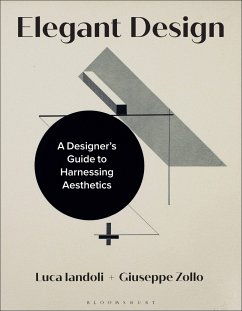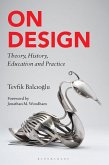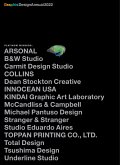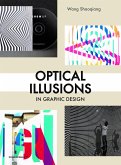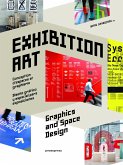- Gebundenes Buch
- Merkliste
- Auf die Merkliste
- Bewerten Bewerten
- Teilen
- Produkt teilen
- Produkterinnerung
- Produkterinnerung
"Analyzing the work of great artists and designers, with the help of psychology, Elegant Design identifies actionable aesthetic strategies to achieve effective design. It shows how to use these strategies to create visual formats that maximize meaning while using minimum information: the outcome is effective complexity. With case studies in design that successfully navigate complexity and simplicity, such as Nest, and with a variety of exercises at the end of each chapter to train your brain to use aesthetics in this way, this book will be your guide to develop a swinging mind: one that may…mehr
Andere Kunden interessierten sich auch für
![On Design On Design]() Tevfik BalciogluOn Design111,99 €
Tevfik BalciogluOn Design111,99 €![Critical Visualization Critical Visualization]() Peter A HallCritical Visualization111,99 €
Peter A HallCritical Visualization111,99 €![Making Data Making Data]() Making Data133,99 €
Making Data133,99 €![Graphis Design Annual 2022 Graphis Design Annual 2022]() Graphis Design Annual 202260,99 €
Graphis Design Annual 202260,99 €![Optical Illusions in Graphic Design Optical Illusions in Graphic Design]() Optical Illusions in Graphic Design37,99 €
Optical Illusions in Graphic Design37,99 €![Exhibition Art - Graphics and Space Design Exhibition Art - Graphics and Space Design]() Exhibition Art - Graphics and Space Design50,99 €
Exhibition Art - Graphics and Space Design50,99 €![Unpack Me!: New Packaging Design Unpack Me!: New Packaging Design]() Unpack Me!: New Packaging Design50,99 €
Unpack Me!: New Packaging Design50,99 €-
-
-
"Analyzing the work of great artists and designers, with the help of psychology, Elegant Design identifies actionable aesthetic strategies to achieve effective design. It shows how to use these strategies to create visual formats that maximize meaning while using minimum information: the outcome is effective complexity. With case studies in design that successfully navigate complexity and simplicity, such as Nest, and with a variety of exercises at the end of each chapter to train your brain to use aesthetics in this way, this book will be your guide to develop a swinging mind: one that may swing from order and disorder, details and context, equilibrium and disruption, and familiarity and novelty. It will teach you how to create design that is as simple as possible - but not simpler"--
Produktdetails
- Produktdetails
- Verlag: Bloomsbury Academic
- Seitenzahl: 200
- Erscheinungstermin: 24. Mai 2022
- Englisch
- Abmessung: 277mm x 218mm x 17mm
- Gewicht: 907g
- ISBN-13: 9781350177451
- ISBN-10: 1350177458
- Artikelnr.: 62759511
- Verlag: Bloomsbury Academic
- Seitenzahl: 200
- Erscheinungstermin: 24. Mai 2022
- Englisch
- Abmessung: 277mm x 218mm x 17mm
- Gewicht: 907g
- ISBN-13: 9781350177451
- ISBN-10: 1350177458
- Artikelnr.: 62759511
Luca Iandoli is Associate Dean for Global Programs and Research and a professor in the Department of Computer Science at St. John's University. Luca was a Fulbright Visiting Scholar at the MIT Center for Collective Intelligence and served as associate professor at the University of Naples Federico II, Italy, and as visiting professor at Stevens Institute of Technology, USA. His research focuses on collective intelligence, interaction design, and product aesthetics. Giuseppe Zollo is Professor of Business and Management at the University of Naples Federico II, Schools of Engineering and School of Architecture, Italy. With a background in architecture and information science, Giuseppe's research focuses on complex systems, organizational learning and sense-making. His intellectual interests span from cognitive studies on art appreciation to history of science and technology.
Preface Introduction The age of aesthetics Elegant decisions The art of
simplicity Getting started 1. The Simplifying Machine Impressions Simple
minds What do you see is what do you get? Understanding as pattern
recognition The joy of guessing: ambiguity and emotions in understanding
The role of aesthetic pleasure in understanding Too good to be true
Creativity Lab: how the mind simplifies reality and compresses information
2. Beauty as Effective Complexity There is no recipe for creativity The
hidden workflow of the creative process How does it feel? The roles of
emotions in aesthetic experience When good is good enough? Beautify as
effective complexity Strategies for effective complexity Conclusions: the
necessity of art Creativity Lab: handling complexity in design Part One:
Search for Unity Strategies 3. Subtract Details The art of concision The
case for abstraction Subtracting the obvious, adding the meaningful Small
talks The science of brevity Conclusions Creativity Lab: subtracting
details from your design without loosing meaningful performance 4. Symmetry
Blood, sweat, and tears: what goes up, can't go down The invention of the
point of view: symmetry in art Managing symmetry: checks and balances The
science of symmetry Conclusions Creativity Lab: how to handle symmetry and
asymmetry in your design 5. The Power of Grouping A stroll down the memory
lane The power of grouping in art: seeking as creating What is your
product? The danger of cognitive inertia and the wonders of creative
categorization The science of grouping Conclusions Creativity Lab:
Effectively grouping information in your design 6. Split Lizards, infinite
lawns, and the invention of the hypertext The devil is in the detail The
ergonomics of simplicity: the NEST thermostat The science of split
Conclusions Creativity Lab: how to design effective information layers and
hierarchy Part Two: Push for Variety Strategies 7. The Power of the Center
May the force be with you The power of the center in art: equilibrium as
dynamic tension The power of obsession: how extreme focus can make your
business thrive (or die) The science of split: the eye of the beholder
Conclusion Creativity Lab: identifying attention-structuring centers in
your design 8. Emphasize An umbrella on four wheels Emphasize in art Think
different: emphasize in design and management The science of emphasizing
Creativity Lab: how to make your design stand out by harnessing the power
of emphasis 9. Remix Mission Impossible Metamorphosis or the Nature of
Change What's your story? A chairman walks into a lab The science of remix
Conclusions Creativity Lab: effectively reshuffling your design to search
for novelty 10. Contrast and Balance Chess and balance Present, tense Lost
in transition The science of contrast Conclusions: keep on moving
Creativity Lab: How to creative effective visual weight dynamics 11. The
Swinging Mind Black holes and supernovas: navigating the design continuum
The critical role of granularity in design When good is good enough: the
swinging mind Design as persuasion Creativity Lab: everyday exercises to
cultivate a swinging mind Conclusion Index
simplicity Getting started 1. The Simplifying Machine Impressions Simple
minds What do you see is what do you get? Understanding as pattern
recognition The joy of guessing: ambiguity and emotions in understanding
The role of aesthetic pleasure in understanding Too good to be true
Creativity Lab: how the mind simplifies reality and compresses information
2. Beauty as Effective Complexity There is no recipe for creativity The
hidden workflow of the creative process How does it feel? The roles of
emotions in aesthetic experience When good is good enough? Beautify as
effective complexity Strategies for effective complexity Conclusions: the
necessity of art Creativity Lab: handling complexity in design Part One:
Search for Unity Strategies 3. Subtract Details The art of concision The
case for abstraction Subtracting the obvious, adding the meaningful Small
talks The science of brevity Conclusions Creativity Lab: subtracting
details from your design without loosing meaningful performance 4. Symmetry
Blood, sweat, and tears: what goes up, can't go down The invention of the
point of view: symmetry in art Managing symmetry: checks and balances The
science of symmetry Conclusions Creativity Lab: how to handle symmetry and
asymmetry in your design 5. The Power of Grouping A stroll down the memory
lane The power of grouping in art: seeking as creating What is your
product? The danger of cognitive inertia and the wonders of creative
categorization The science of grouping Conclusions Creativity Lab:
Effectively grouping information in your design 6. Split Lizards, infinite
lawns, and the invention of the hypertext The devil is in the detail The
ergonomics of simplicity: the NEST thermostat The science of split
Conclusions Creativity Lab: how to design effective information layers and
hierarchy Part Two: Push for Variety Strategies 7. The Power of the Center
May the force be with you The power of the center in art: equilibrium as
dynamic tension The power of obsession: how extreme focus can make your
business thrive (or die) The science of split: the eye of the beholder
Conclusion Creativity Lab: identifying attention-structuring centers in
your design 8. Emphasize An umbrella on four wheels Emphasize in art Think
different: emphasize in design and management The science of emphasizing
Creativity Lab: how to make your design stand out by harnessing the power
of emphasis 9. Remix Mission Impossible Metamorphosis or the Nature of
Change What's your story? A chairman walks into a lab The science of remix
Conclusions Creativity Lab: effectively reshuffling your design to search
for novelty 10. Contrast and Balance Chess and balance Present, tense Lost
in transition The science of contrast Conclusions: keep on moving
Creativity Lab: How to creative effective visual weight dynamics 11. The
Swinging Mind Black holes and supernovas: navigating the design continuum
The critical role of granularity in design When good is good enough: the
swinging mind Design as persuasion Creativity Lab: everyday exercises to
cultivate a swinging mind Conclusion Index
Preface Introduction The age of aesthetics Elegant decisions The art of
simplicity Getting started 1. The Simplifying Machine Impressions Simple
minds What do you see is what do you get? Understanding as pattern
recognition The joy of guessing: ambiguity and emotions in understanding
The role of aesthetic pleasure in understanding Too good to be true
Creativity Lab: how the mind simplifies reality and compresses information
2. Beauty as Effective Complexity There is no recipe for creativity The
hidden workflow of the creative process How does it feel? The roles of
emotions in aesthetic experience When good is good enough? Beautify as
effective complexity Strategies for effective complexity Conclusions: the
necessity of art Creativity Lab: handling complexity in design Part One:
Search for Unity Strategies 3. Subtract Details The art of concision The
case for abstraction Subtracting the obvious, adding the meaningful Small
talks The science of brevity Conclusions Creativity Lab: subtracting
details from your design without loosing meaningful performance 4. Symmetry
Blood, sweat, and tears: what goes up, can't go down The invention of the
point of view: symmetry in art Managing symmetry: checks and balances The
science of symmetry Conclusions Creativity Lab: how to handle symmetry and
asymmetry in your design 5. The Power of Grouping A stroll down the memory
lane The power of grouping in art: seeking as creating What is your
product? The danger of cognitive inertia and the wonders of creative
categorization The science of grouping Conclusions Creativity Lab:
Effectively grouping information in your design 6. Split Lizards, infinite
lawns, and the invention of the hypertext The devil is in the detail The
ergonomics of simplicity: the NEST thermostat The science of split
Conclusions Creativity Lab: how to design effective information layers and
hierarchy Part Two: Push for Variety Strategies 7. The Power of the Center
May the force be with you The power of the center in art: equilibrium as
dynamic tension The power of obsession: how extreme focus can make your
business thrive (or die) The science of split: the eye of the beholder
Conclusion Creativity Lab: identifying attention-structuring centers in
your design 8. Emphasize An umbrella on four wheels Emphasize in art Think
different: emphasize in design and management The science of emphasizing
Creativity Lab: how to make your design stand out by harnessing the power
of emphasis 9. Remix Mission Impossible Metamorphosis or the Nature of
Change What's your story? A chairman walks into a lab The science of remix
Conclusions Creativity Lab: effectively reshuffling your design to search
for novelty 10. Contrast and Balance Chess and balance Present, tense Lost
in transition The science of contrast Conclusions: keep on moving
Creativity Lab: How to creative effective visual weight dynamics 11. The
Swinging Mind Black holes and supernovas: navigating the design continuum
The critical role of granularity in design When good is good enough: the
swinging mind Design as persuasion Creativity Lab: everyday exercises to
cultivate a swinging mind Conclusion Index
simplicity Getting started 1. The Simplifying Machine Impressions Simple
minds What do you see is what do you get? Understanding as pattern
recognition The joy of guessing: ambiguity and emotions in understanding
The role of aesthetic pleasure in understanding Too good to be true
Creativity Lab: how the mind simplifies reality and compresses information
2. Beauty as Effective Complexity There is no recipe for creativity The
hidden workflow of the creative process How does it feel? The roles of
emotions in aesthetic experience When good is good enough? Beautify as
effective complexity Strategies for effective complexity Conclusions: the
necessity of art Creativity Lab: handling complexity in design Part One:
Search for Unity Strategies 3. Subtract Details The art of concision The
case for abstraction Subtracting the obvious, adding the meaningful Small
talks The science of brevity Conclusions Creativity Lab: subtracting
details from your design without loosing meaningful performance 4. Symmetry
Blood, sweat, and tears: what goes up, can't go down The invention of the
point of view: symmetry in art Managing symmetry: checks and balances The
science of symmetry Conclusions Creativity Lab: how to handle symmetry and
asymmetry in your design 5. The Power of Grouping A stroll down the memory
lane The power of grouping in art: seeking as creating What is your
product? The danger of cognitive inertia and the wonders of creative
categorization The science of grouping Conclusions Creativity Lab:
Effectively grouping information in your design 6. Split Lizards, infinite
lawns, and the invention of the hypertext The devil is in the detail The
ergonomics of simplicity: the NEST thermostat The science of split
Conclusions Creativity Lab: how to design effective information layers and
hierarchy Part Two: Push for Variety Strategies 7. The Power of the Center
May the force be with you The power of the center in art: equilibrium as
dynamic tension The power of obsession: how extreme focus can make your
business thrive (or die) The science of split: the eye of the beholder
Conclusion Creativity Lab: identifying attention-structuring centers in
your design 8. Emphasize An umbrella on four wheels Emphasize in art Think
different: emphasize in design and management The science of emphasizing
Creativity Lab: how to make your design stand out by harnessing the power
of emphasis 9. Remix Mission Impossible Metamorphosis or the Nature of
Change What's your story? A chairman walks into a lab The science of remix
Conclusions Creativity Lab: effectively reshuffling your design to search
for novelty 10. Contrast and Balance Chess and balance Present, tense Lost
in transition The science of contrast Conclusions: keep on moving
Creativity Lab: How to creative effective visual weight dynamics 11. The
Swinging Mind Black holes and supernovas: navigating the design continuum
The critical role of granularity in design When good is good enough: the
swinging mind Design as persuasion Creativity Lab: everyday exercises to
cultivate a swinging mind Conclusion Index

